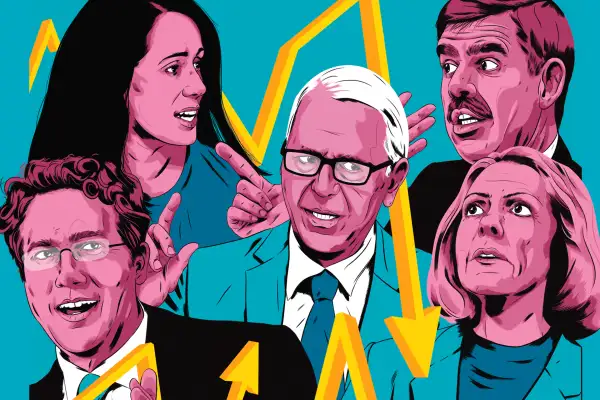The Best Move You Can Make With Your Investments in 2019, According to 5 Market Professionals
Money is not a client of any investment adviser featured on this page. The information provided on this page is for educational purposes only and is not intended as investment advice. Money does not offer advisory services.

Investors enter 2019 with the U.S. economy humming and the stock market in the midst of the longest bull market on record. And yet they can't seem to find enough to worry about. High stock valuations, rising interest rates, and global political dysfunction have all combined to make the final weeks of 2018 some of the rockiest all year.
Can the stock market regain momentum? Where are the best opportunities for investors in the new year? We talked to five market pros to find out:
Have Ready Cash
Mohamed El-Erian, chief economic advisor at Allianz
"Don't assume you will see a repeat of 2017's returns or anything close to that. Remain somewhat cautious, and have dry powder, that is, cash, ready to pick up good assets at bargain prices. If you are investing in fixed income, stay at the short end of the yield curve. Emerging-markets equity should become attractive sometime in 2019, but I disagree with those who say now is a good time to rotate out of the U.S. and into overseas markets. I say, not just yet. There's still going to be a further selloff, so prices will go down before they come back up."
"Time to Be More Cautious"
Nicholas Sargen, senior vice president, chief economist, and senior investment advisor at Fort Washington Investment Advisors
"While I'm not bearish yet, it's time to be more cautious and get used to higher volatility. Picking specific sectors to invest in is very tough right now. I would normally say that a rising rate environment tends to be good for financial stocks, whose business is lending to borrowers, but we've also had a flattening of the yield curve, which cuts the other way. If you don't want to take risks in U.S. equity, I would lean toward bonds in the short term but then eventually [go] toward international or emerging-market stocks longer term."
Look Overseas
Matthew McLennan, head of global value team and portfolio manager at First Eagle Investment Management
"The upcoming year is going to be a time when investors need to have more modest expectations. Be willing to hold some cash—which lets you wait for bargains. Gold is another potential hedge that gives you a sound store of value just in case. While foreign markets have underperformed because of weaker currencies and lower multiples, at some point it's going to make sense to invest in good companies overseas, particularly because the strength of the dollar—held up by the difference in interest rates—will eventually come to an end."
Favor "Strong Fundamentals"
Saira Malik, managing director and head of global equities at Nuveen
"There's still money to be made in the late cycles of a bull market. However, rising rates and inflation are likely to mean slower U.S. growth and lower returns. As a result, it's unlikely the U.S. stock market will continue to outpace foreign ones. Non-U.S. markets like Europe, which has avoided the heat from most trade issues, and Brazil, now that the election is over, are big opportunities. Within the U.S. there will be a shift away from premium growth stocks. That means companies with strong fundamentals, particularly within the financial services and health care sectors, will be attractive investments."
"Take a Little Less Risk"
Kate Warne, principal and investment strategist at Edward Jones
"Investors need to take a little less risk in their portfolios by adding more fixed income and getting back to the right mix of stocks and bonds. Make sure you don't have too much invested in big technology stocks. Look instead for stocks with more attractive price-to-earnings ratios. Both developed- and emergingmarkets stocks are cheaper than U.S. large-caps and look attractive, although they have underperformed in 2018 because of slower economic growth, tariff concerns, and a strong U.S. dollar. There is a good chance the dollar could weaken in 2019, either because of easing of geopolitical concerns or worries about the rising U.S. budget deficit. A weaker dollar would boost returns for international stocks."